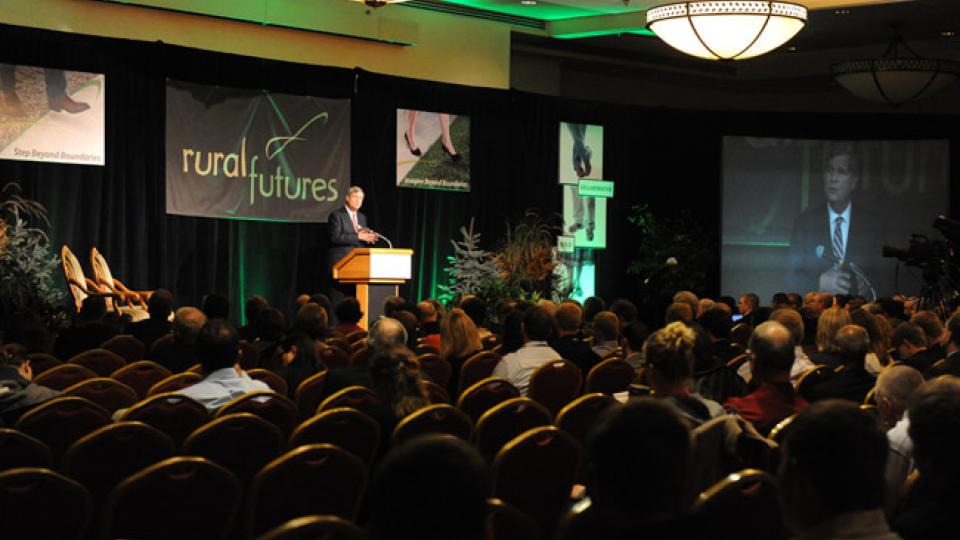
The University of Nebraska's Rural Futures Institute had a new rural serviceship program that would send students around the state to work with community leaders to solve real-world challenges while simultaneously earning university credit.
It was a perfect match – and now Neligh leaders have a series of student-produced videos called "This is My Neligh" that they can use to tell potential new residents about their city's amenities, businesses and quality of life.
That's one example of how the Rural Futures Institute has already begun to impact Nebraska in the two years since its establishment. The institute, which engages faculty from all four NU campuses and partners around the state, is focused on building local leaders who seek communities that are vibrant economically, socially and culturally, and that provide a legitimate choice for young people to launch careers and build families.
"Rural matters. It's that simple. The vitality of our rural communities has a profound impact on the success of the state as a whole, and the University of Nebraska – the state's only public university – has a responsibility to play a leading role in ensuring that vitality," said Chuck Schroeder, the founding executive director of the Rural Futures Institute. "That's what the Rural Futures Institute aims to do. Nebraska has a unique opportunity to take a leading role in this arena and we can’t wait to work with our partners around the state to make that happen."
Schroeder noted that rural development involves a number of key issues, notably job creation and workforce availability, youth engagement, education, healthcare and others. The Rural Futures Institute aims to engage in each of these issues. For example, the institute has awarded two dozen grants over the past two years to faculty and external partners to pursue teaching, research and engagement projects focused on topics critical to rural people and communities, including workforce development, rural leadership and engagement, health and nutrition, the shortage of mental health providers in rural areas, agritourism, agricultural entrepreneurship and recruitment of talented workers and companies to rural areas.
Beyond that, the student serviceship program has sent NU students to six communities in addition to Neligh – Kimball, Valentine, Holdrege, Ord, Red Cloud and Seward – to work with community leaders on meaningful service projects.
The institute also hosted an inaugural Rural Futures Conference in 2012, with a second conference in 2013 and a third planned for 2015. A series of forums across Nebraska this fall hosted by the institute will showcase local success stories in economic and community development and identify opportunities for future partnerships.
While the institute has built impressive early momentum, Schroeder noted that the institute's current budget supports limited personnel and programming. The university hopes to use additional state funds to leverage its investment in the RFI and build on its momentum. NU's 2015-17 biennial budget request includes a $20 million economic competitiveness package that seeks to advance university initiatives related to workforce development, talent recruitment, public-private partnerships, and research and innovation. About $1.5 million of that package would be directed to the Rural Futures Institute to help advance its goal to become a globally recognized center for issues related to rural development.
"An investment from the state would do a great deal to accelerate our progress," Schroeder said. "The plans we have in place would invest those dollars in ways that directly benefit the people of the state. We’re excited about the opportunities we have to take the Rural Futures Institute to the next level of success."
Schroeder said the additional support would support:
Personnel needs, including investments in faculty experts in research, education, engagement, public policy and cultural advocacy.
Annual symposia in rural areas that would build on this year's forums, and a biennial conference with national and international appeal.
Continuation of the successful grant program to allow NU faculty to continue advancing projects that are relevant and timely to the work of the institute.
The "Community Vitality Initiative," a partnership with UNL's Cooperative Extension focused on strengthening workforce development, entrepreneurship and business growth in rural areas and encouraging young people to live and work in rural communities after they complete their educations.
The other components of the university's proposed economic competitiveness package include Nebraska Innovation Campus, the National Strategic Research Institute, the Peter Kiewit Institute, the Health Science Education Complex in Kearney, and business engagement and workforce development initiatives across all four campuses.
— Melissa Lee, NU Central Administration